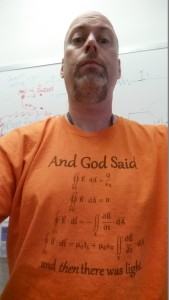My name is John McCloskey. I created this blog to share my thoughts about math, because it is a subject that is near and dear to my heart. I’ve had many conversations about math with a number of people over the years, and I figure that it’s time to write some of these thoughts down.
For starters, I love math. I always have. My brain is clearly wired for it, and it has always just made sense to me. I’m sure that played a significant factor in my career path (NASA engineer, a.k.a. “rocket scientist”).
Math is an integral (pun fully intended) part of your life, whether or not you realize it. That bridge you use in your morning commute? Math made that possible. Your office building, designed to be structurally sound and not collapse on top of you? Math again. And your Smartphone? Math, math, math, math, math (and some more math).
And here’s the big secret (not really; it just seems to feel like one): MATH IS NOT HARD. It’s not. Really.
Many people (myself included) use math every day in our work. If we can do it, you can too.
As I will demonstrate on this blog for anybody who cares, all of math, EVERY LAST BIT OF IT, ultimately boils down to basic arithmetic, i.e. good ol’ addition, subtraction, multiplication, and division. Every mathematical operation that looks like something more complicated is merely providing shorthand notation for specific combinations of the above operations.
And as shown on the Arithmetic page, those 4 operations further boil down to addition.
This it is, and nothing more.
On behalf of math lovers everywhere, I am deeply sorry if you never had a math teacher who taught you that it need not be any more complicated than this.
But now you do. Stay tuned to this site to learn more.

Thanks for doing this!
Not to nitpick, but…doesn’t all math boil down to addition? Subtraction is addition of a negative number. Multiplication is repeated addition. Division is repeated addition of a negative number (counting the number of times that addition is possible).
Will you be covering the non-“calculating” ideas like set theory as well?
Hey Tom! Agreed; that very point was bothering me, and I was intending to make it in an upcoming post. I have a lot of topics in mind I’d like to cover; I’m obviously just getting started. I must admit that set theory is not one of my stronger suits, but I suppose that’s a good reason to do some homework. Can you be a little more specific about what you’d like to see?
I just added an “Arithmetic” page to address this concern.